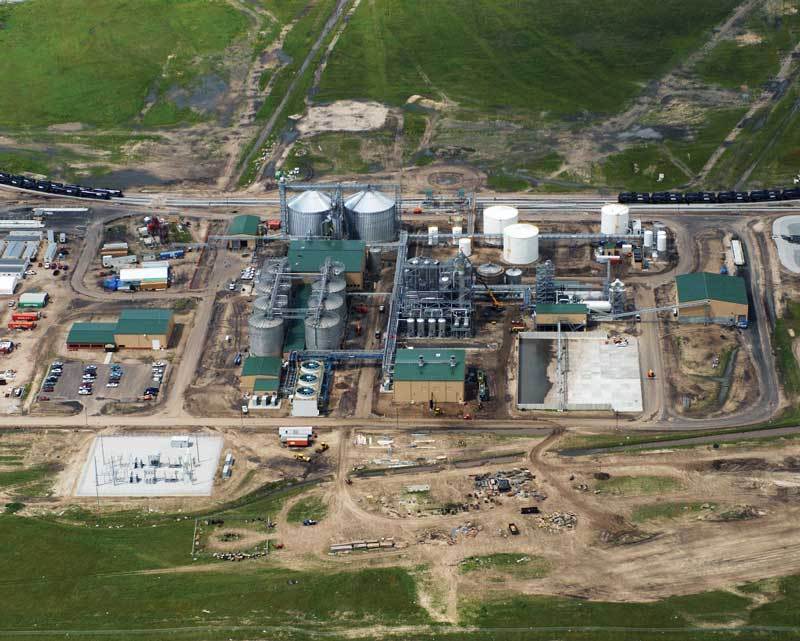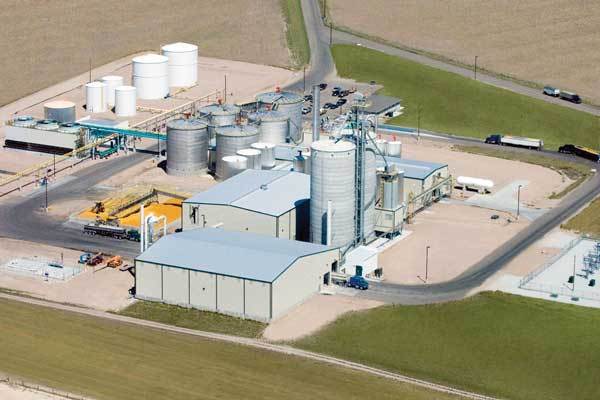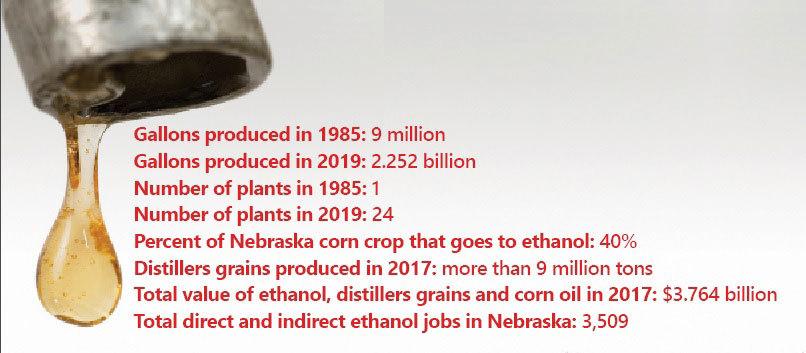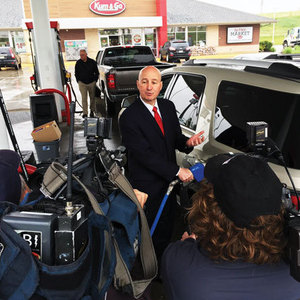A 'Golden Triangle'





PHOTO: OFFICE OF GOV. PETE RICKETTS
August 1, 2019
BY Matt Thompson
It’s fitting that the Cornhusker State should be an important player in the nation’s ethanol industry. Second only to Iowa in production, Nebraska’s ethanol industry has a big impact on the state’s economy.
In addition to a strong corn-growing contingent, Nebraska has an impressive cattle sector, and strong railroad infrastructure. With the state’s central location, it’s clear there are several benefits to producing ethanol there.
“The ethanol industry, the livestock industry and the agricultural community as a whole, we call that the ‘golden triangle,’” says Roger Berry, incoming administrator of the Nebraska Ethanol Board. “You grow the corn to produce the ethanol, you get the distillers grains, which then feeds the livestock, which then just starts the cycle all over again. It just all supports each other.”
The NEB is the only state agency dedicated to promoting ethanol within Nebraska. “Other state ethanol groups are generally trade groups, like the Iowa Renewable Fuels Association or others,” says Sarah Caswell, outgoing administrator of the NEB. “We are dedicated to helping ensure the continued strength and growth of Nebraska’s ethanol industry, recognizing the importance of the industry as a value-added culture market for corn and other commodities.”
Ethanol’s Economics
A study by the University of Nebraska - Lincoln found Nebraska’s ethanol plants contribute $3.5 billion to the state’s economy, as well as more than 1,400 direct jobs with an average salary of $78,000. “That’s significant because a lot of these jobs are in rural communities, so they help support families and communities in rural towns and areas,” Caswell says.
“These are great paying jobs for our small towns and rural communities,” says Nebraska Gov. Pete Ricketts. “So we are very excited about the longevity of some of these companies to be able to create those great paying jobs in our small towns.”
Ricketts is no stranger to the ethanol industry. Caswell says, “I don’t know more of an ethanol advocate than him, to be honest. He and his office have been extremely helpful and supportive to our efforts here at the board to promote the industry.”
One of Ricketts’ goals is educating the public about the benefits of ethanol. “I think a lot of consumers, even in Nebraska, don’t understand how important it is and what a benefit they get from filling up with ethanol,” he says. “I think that’s an opportunity for everybody who’s involved in this industry.”
Nebraska even has a U.S. EPA-approved pilot program to study the use of higher blends in state-owned vehicles. EPA granted a waiver to the state of Nebraska to use E30 in non-flex fuel vehicles, and a waiver to co-applicant retail stations to sell E30 to vehicles participating in the study. “We’re going to study mileage and maintenance and so forth to help raise awareness, educate people, and really dispel some of the myths that are out there about using higher blends of ethanol,” Ricketts says.
Caswell says that while other E30 studies have been done, Nebraska’s will be the first to be overseen by an engineering team. The study began in early June and will run for one year. “We’re using 52 state fleet vehicles in this program, 26 matched pairs so that one control vehicle will fill up with regular gasoline, and the E30 vehicle will fill up with E30 and we’ll compare and contrast,” Caswell says.
“Especially given the current state of play of the Renewable Fuel Standard, and other ethanol policies at the federal level, it’s very encouraging that EPA has provided this waiver to our state,” she says.
Legislative Support
Ricketts isn’t the only political figure advocating for ethanol. Sen. Deb Fischer, R-Neb., is considered one of the leading Republican advocates for the biofuels industry. “They’ve been the ones at the forefront of fighting or advocating to the EPA in the past couple of years that they implement the RFS in a way to guarantee the most robust volume requirements for ethanol possible and to implement the RFS to help facilitate the industry as it was intended under the law,” Caswell says.
In June, Fischer introduced a bill with Sen. Tammy Duckworth, D-Ill., that seeks to increase transparency in the small refinery exemption process. “In the past, EPA has issued small refinery exemptions after the renewable volume obligations have already been determined,” Fischer said when the bill was announced. “That’s unfair, and it hurts our farmers and ethanol producers. This bill would shine a light on what’s been an obscure exemption process and help promote economic growth in rural America.” The bill would require petitions for exemptions be filed by June 1 each year, and would require EPA to report to Congress its method for granting small refinery exemptions.
In addition, Rep. Adrian Smith, R-Neb., was one of the signatories on a letter sent to EPA outlining concerns about the administration’s process for granting small refinery waivers. “They ended up getting 35 bipartisan signatures on their letter that they sent to Administrator Wheeler at the EPA expressing deep concern about their current process for evaluating petitions for small refinery waivers,” Caswell says. “We have excellent representation in Congress and at the state level.”
Innovation in Nebraska
Nebraska’s ethanol industry is a leader in innovation, Caswell and Berry say. “We have 25 existing ethanol plants, and as the industry develops and grows, those plants and their attributes, like being close to railroads, make it very attractive for, say, renewable chemicals producers to look to partner with those existing facilities and, as a result, we’ve seen bio-campuses pop up all over the state,” Caswell says.
Berry points to innovations like those at Flint Hills Resources in Fairmont, Nebraska. “They have developed a system into their plant which is allowing them to produce a very high-protein feed, which is going to aquaculture.”
The plant added Fluid Quip Process Technologies’ Maximized Stillage Coproducts technology late last year. Mark Murphy, general manager of ingredients at Flint Hills, says, “We’re happy with the results. We’re able to make another valuable protein product for the market without affecting ethanol production.”
Siouxland Ethanol in Jackson has recently been certified by the California Air Resources Board to sell its cellulosic corn kernel fiber ethanol in California under the state’s Low Carbon Fuel Standard.
Another ethanol innovation taking shape in Nebraska is the addition of White Dog Labs’ ProTyton production technology. ProTyton is a single-cell protein ingredient used in the aquaculture market, and Midwest Renewable Energy in Sutherland will be the first ethanol plant to use the technology. Invest Nebraska, the state’s public-private venture development organization, invested in White Dog late last year.
Joe Shanle, senior plant manager at MRE, told Ethanol Producer Magazine earlier this year the decision to add the ProTyton production technology was a factor of market conditions. “We thought this was a nice way to diversify our product offering so at least we can begin to take the starch from corn and target different markets, whether that’s the protein market or the fuels market.”
Nebraska also hosts the Emerging Issues Forum each year, Berry says. He says the forum is “always on the cusp of what’s going on in these new technologies and that’s attended by people all over the nation.
“The plants here in Nebraska, they’re not standing still,” Berry says. “They are making sure they continue to increase their efficiencies by bringing in these different processes and, with the increase in efficiency, it helps the profitability of that plant, too.”
Facing Challenges, Looking Forward
Nebraska wasn’t immune to the flooding experienced by much of the Midwest this year. States across the corn belt dealt with wet conditions that set planting back, which could impact corn ethanol feedstock across the country. “What probably will affect the ethanol plants down the road is how many acres are going to be prevented from planting this year, due to the flooding and due to the wet conditions,” Berry says. “Those rivers changed course and just deposited sand on the fields.”
But the future of ethanol in the state is bright. Nebraska’s state legislature recently created a grant program for renewable fuel infrastructure. The NEB was supportive of the legislation and is now working with other industry stakeholders in the state to determine how the program will be funded, Caswell says.
“The ultimate goal is to eventually get every station in Nebraska to be able to offer that choice, so every consumer has the opportunity to buy a better fuel at a lower cost to them and keep money in their pockets,” Berry says.
‘We Have it All Here’
Beyond its “golden triangle,” a number of factors combine to make Nebraska conducive to ethanol production. “It all kind of goes together,” Caswell says. “We have UNL with top-notch engineers and scientists and facilities, resources. We have an extremely supportive governor. We have an existing, relatively mature ethanol industry here in Nebraska, and expertise in agriculture, we have a low cost of living, we have railroads, we’re the western-most ethanol-producing state to be fed into California. We have it all here.”
Two ethanol companies in the state recently celebrated their 15th year of continuous operations: Trenton Agri Products in Trenton, and KAAPA Ethanol, with plants in Minden and Ravenna. Ricketts says the longevity of these companies shows how favorable Nebraska is for business.
“Companies like KAAPA and Trenton Agri Products really have that opportunity to have that long-lasting impact on our state, and they will continue to invest here,” he says. “They’ll continue to grow jobs.”
Author: Matt Thompson
Associate Editor, Ethanol Producer Magazine
701.738.4922
mthompson@bbiinternational.com
Advertisement
Advertisement
Advertisement
Advertisement
Related Stories
U.S. fuel ethanol capacity fell slightly in April, while biodiesel and renewable diesel capacity held steady, according to data released by the U.S. EIA on June 30. Feedstock consumption was down when compared to the previous month.
XCF Global Inc. on July 8 provided a production update on its flagship New Rise Reno facility, underscoring that the plant has successfully produced SAF, renewable diesel, and renewable naphtha during its initial ramp-up.
The U.S. exported 31,160.5 metric tons of biodiesel and biodiesel blends of B30 and greater in May, according to data released by the USDA Foreign Agricultural Service on July 3. Biodiesel imports were 2,226.2 metric tons for the month.
The USDA’s Risk Management Agency is implementing multiple changes to the Camelina pilot insurance program for the 2026 and succeeding crop years. The changes will expand coverage options and provide greater flexibility for producers.
EcoCeres Inc. has signed a multi-year agreement to supply British Airways with sustainable aviation fuel (SAF). The fuel will be produced from 100% waste-based biomass feedstock, such as used cooking oil (UCO).
Upcoming Events










